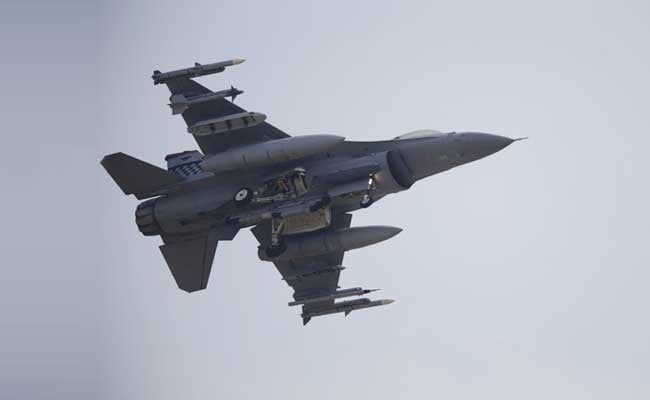From Russian Occupation To War Tourism: Ukraine Town Looks To Future
More than nine months after Russian troops left Svyatogirsk in Ukraine's eastern Donetsk region, life is still precarious for the 900 people living in the former resort town.

Burnt-out armoured personnel carriers lie along the road. Shop windows are smashed and there is no running water.
More than nine months after Russian troops left Svyatogirsk in Ukraine's eastern Donetsk region, life is still precarious for the 900 people living in the former resort town.
Built in pine woods on the Siversky Donets river, the town was once a popular holiday destination, dominated by a white Orthodox Christian monastery high above the river.
Now the head of the military administration, Volodymyr Rybalkin, says he sees a new future for the town, focusing on war tourism.
Dressed in khaki t-shirt and trousers, he walks down the main street past shops and cafes with shattered facades.
The town's buildings are "all damaged," while several dozen were completely destroyed, he said.
Few businesses are open, but there are signs of returning life.
Retired businessman, Oleksandr, 70, sweeps up broken glass in the flower shop he owns on the main strip.
"Everything is smashed," he says.
"I'm fixing it up. My children have moved elsewhere, so now I have to work."
Smashed glass litters the mini-market next door, whose roof, windows and walls were pierced by shrapnel from a missile explosion.
All buildings damaged'
Mr Rybalkin was appointed by Ukrainian President Volodymyr Zelensky after his predecessor allegedly collaborated with Russian occupying forces who held the town from June to September 2022.
"This zone was perpetually under shelling," Mr Rybalkin says, warning to walk on the tarmac due to mines in grassy areas.
A local woman was killed last week by an anti-personnel mine on the river bank.
With few resources for a major clean-up, war damage still appears fresh.
Destroyed military vehicles stand near a former military hospital and parts of shells and metal fragments lie in the dust.
But Mr Rybalkin predicts that in five years the town will be "full of tourists".
"But this will rather be historical and military tourism, based on the events that took place here -- and this will be after victory."
Svyatogirsk has had no central water supply for more than a year due to smashed pipes and treatment works.
"It will be back this year" vowed the town chief.
He showed schemes to help residents do everything from showering to washing clothes to getting a cooked lunch.
The money for these has come from international aid organisations, with water being trucked in.
Sign up for shower
A shipping container has been divided up into cubicles for showers, a toilet and washing machines, while a log stove heats water.
People have to sign up in advance and are likely to be able to shower only every couple of weeks.
"It's a pleasure for people to come here," said the attendant, Oksana, a former teaching assistant whose workplace and house have both been destroyed.
"I live with my neighbour now," she says.
"I still have a small shed. I'm now thinking of how to insulate it."
"Let's hope we have peace and everything is restored."
Nearby, 15-year-old Elvira hands over a lunch of tuna and rice with chopped beetroot and vegetable salad at a World Central Kitchen cafeteria, where people can eat in or take home.
"I've been here a while: four months or so," she says.
"We have remote schooling in Ukraine so after work I go home and do my homework," she adds, smiling, saying she hopes to train as a hairdresser.
Local children are also doing art classes at a summer day camp, organised by a Ukrainian NGO, Base UA.
"You can really see how their development is limited because they don't have socialising," says culture lead, Alexandra Chernomashyntseva.
"Here they cannot walk around because of all the mines in the forest."
Painful divisions
Svyatogirsk's story highlights painful divisions within Ukraine.
When Russian troops took control, the sitting mayor, Volodymyr Bandura, reportedly collaborated with the occupying forces.
He left with the Russians, along with some 200 residents, and is now on the run.
"At the moment a criminal case has been opened," the current town chief said.
"Now we can look each other in the eye and have a laugh."
Mr Rybalkin says, however, he has "no relations" with the leadership of the monastery on his territory, known as the Svyatogirsk Lavra.
The monastery is run by the Ukrainian Orthodox Church, until recently subordinate to the Moscow Patriarchate and still viewed as loyal to Russia.
This is separate from a new, fully independent Orthodox Church of Ukraine.
The walls of the monastery are still peppered holes from shelling.
Peacocks in enclosures squawk in alarm as a fighter jet zooms overhead.
Donetsk regional governor Pavlo Kyrylenko has said moves are underway to evict the black-robed monks, putting it in a similar position to Kyiv's Lavra monastery.
"Pavel Oleksandrovich (Kyrylenko) has told us what will happen next and our task will be to fully facilitate the task for him," says Rybalkin.
Asked if the process would be peaceful, he said: "Let's put it like this: I don't know, I don't fantasise... When issues arise, we will solve them."
(Except for the headline, this story has not been edited by NDTV staff and is published from a syndicated feed.)



































![Safari Thorium Neo 8-Wheel Luggage Set Trolley Bags (Set of 3) at just Rs. 5,599 [MRP 29,100]](https://savefree.in/uploads/images/202409/image_870x580_66f63845060f0.webp?#)












![Handmade Brown Mango Wood Chopping Board At just Rs. 89 [MRP 599]](http://savefree.in/uploads/images/202303/image_870x580_641bf7e9c2206.jpg?#)


